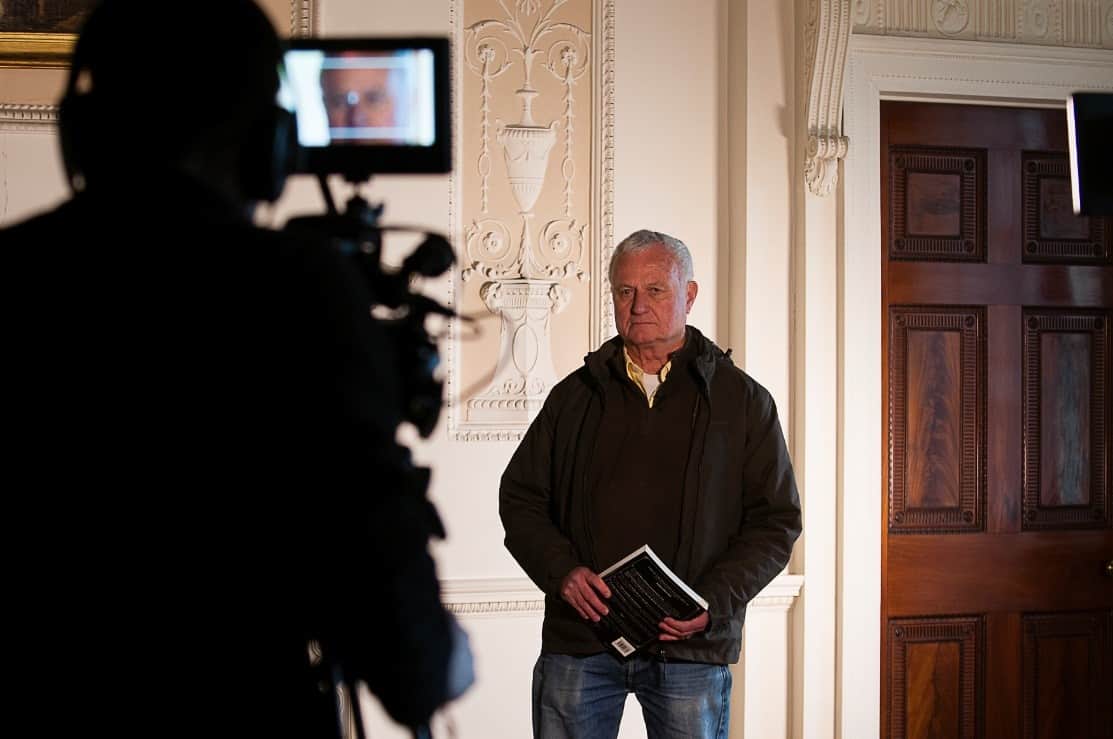Downton Abbey, Americans, and an English Country House MOOC
Guest post by Jim Fitzmaurice (pictured above). Jim is lead educator of the free online course, Literature of the English Country House, starting June 2 on FutureLearn.com. He talks about how snooping around the English Country houses, in which his favourite stories, poems and dramas are set, has deepened his understanding of the lives and … Continued
Guest post by Jim Fitzmaurice (pictured above).
Jim is lead educator of the free online course, Literature of the English Country House, starting June 2 on FutureLearn.com. He talks about how snooping around the English Country houses, in which his favourite stories, poems and dramas are set, has deepened his understanding of the lives and times of the literature he consumes.
As an American and as a retired university English teacher, I can say that my fellow countrymen and women have long been partial to the fiction, poetry, and drama of the country house. Americans also love Shakespeare. There seems to be a Shakespeare festival in every corner of the USA. One of our favourite plays is Twelfth Night, nominally set in Illyria but actually a record of life lived back and forth between two English country houses.
Shakespeare paints us a picture of a spoil-sport head servant named Malvolio and his well-deserved comeuppance in a way that foreshadows the servant politics of Downton Abbey.
Nigel Hawthorne makes a wonderful Malvolio in the film version of Twelfth Night by Trevor Nunn. Imelda Staunton is Hawthorne’s brilliant nemesis. Sir Toby, a poor relation who loves to drink and carouse into the middle of the night, gets a line that we Americans all know. In retort to the spoil-sport head servant, Sir Toby asks, “Shall we have no more cakes and ale?” In this free course we will look at Twelfth Night and take some unexpected approaches to selections of other country house literature. We will visit Bolsover Castle and Hardwick Hall, both of which have kitchens like those in the Nunn film.
A new approach to an item from English literature: Elizabeth Bennet from Pride and Prejudice didn’t fall in love with Darcy until she saw his portrait. Indeed, Elizabeth was poking around Mr Darcy’s home while he was away. She never would have ventured into building, which is pretty much a version of Chatsworth House, if he had been there. We Americans like nothing better than to snoop around, given the chance. Elizabeth should be an honorary American. This country house MOOC, in fact, will involve a good deal of snooping as we go behind the scenes at Chatsworth and stroll into some of the locked rooms at Brodsworth Hall. Brodsworth has many parts that are off limits to the public and that are full of what amounts to ancient junk. We Americans also love to collect junk.
There were plenty of shabby country houses in the time of Charles Dickens, who places his jilted bride-to-be Miss Havisham from Great Expectations in a room that echoes what we will see at Brodsworth. And what could be more fun for an American than to encounter a fellow American, Special Agent Dana Scully from the television series X-Files, when she reappears as that jilted bride in a BBC TV series made from the Dickens novel. The BBC TV series will have been shown on American PBS TV on Masterpiece Theatre. PBS is, of course, where Downton Abbey has its American home. The English, as my children have learned growing up in England, like trying on American accents. Presumably Gillian Anderson (Agent Scully) would have liked speaking the Queen’s English as Miss Havisham.
Americans love the secrets and surprises that come with English country houses. And they sometimes incorporate bits of country house architecture into their own homes.
Americans love the secrets and surprises that come with English country houses. And they sometimes incorporate bits of country house architecture into their own homes. Take the case of the early twentieth-century Los Angeles millionaire Henry E Huntington. Huntington bought eighteenth-century English oil portraits and landscapes of the sort found in Nostell Priory, which (of course) we will visit in the MOOC. Huntington also had a tunnel dug between his LA country house (on 200 acres that are now a botanical garden) and his country house kitchens (now a major research library). In so doing, Huntington did what was done at Haddon Hall, which we will visit in the MOOC.
So, join us in the MOOC. No fees to pay, no books to buy. Lots of informal but serious discussion. We will end the class with a story about the country house experiences of some commercially oriented Americans in Oscar Wilde’s Canterville Ghost. The ghost learns a thing or two from the Americans, one of whom, in turn, is transformed by him into an English lady.
You can sign up for the Literature of the English Country House MOOC, starting June 2 offered via Futurelearn.






